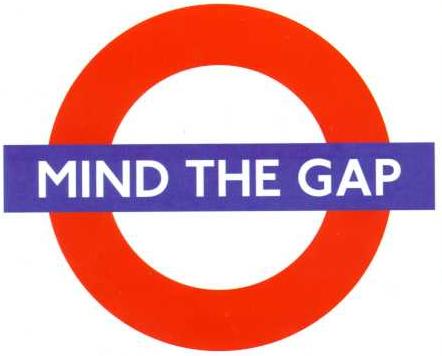

Minding The Gap
As they step from the platform to the train at London’s Embankment tube station passengers are frequently told to “mind the gap.” It’s advice to which the Government should pay attention.
This month saw a further disturbing widening of the gap between the number of people employed and unemployed. 2.5 million people are now without work – put another way, that’s 1 in 12 of the population without jobs.
The yawning gap between those with jobs and those without creates a whole range of other differentials: gaps in personal income, gaps in self esteem and gaps in social acceptance.
Having or not having a job leads to a gap between a person’s innate abilities and their opportunity to fulfil that potential. Being unemployed means having nothing to do which too easily can lead to having nothing to do with the rest of us – opening a gap into which, as the old saw has it, the devil can make mischief for idle hands.
Being unemployed is personally disfiguring, often deeply depressing, and represents a terrible waste of human capital.
This widening employment gap in Britain is particularly disadvantageous
to young people.
1 in 3 of those without work is aged between 16 and 24. Nearly one million young people are out of work. The inelegant acronym NEET describes the hundreds of thousands of young people who are not in employment, education or training. Half of our 16 year olds lack basic qualifications in maths or English and as they are left brooding on sink estates and in urban ghettos many turn to lives of crime and are sucked into drugs and gang culture. The devil is free to have a field day.
Tennyson understood the danger of allowing young people to fester without apparent prospects or hope: “What shall I be at 50 should nature keep me alive, if I find the world so bitter when I am but 25?”That bitterness and anger over the way in which our economy is run found recent expression in the tent city at St.Paul’s Cathedral.
You can disagree with the methods of the protestors – and I do – but like the student protestors against the scandalously high increase in tuition fees the anti-capitalist protestors have a point – not least coming in the same month that Barclays Bank announced three month profits of £1.3 billion – an increase of 5%. And while Barclays are cranking up their profit margins the gap with those in debt gets ever wider: household debt now stands at an average of £57,635 and total UK personal debt has reached a staggering £1,452 billion.
The gap between those who have so much and those who don’t hardly creates a sense that “we’re all in this together” as David Cameron once put it. The top 10% of the population are worth more than three quarters of a million pounds while the bottom 1% have negative wealth – in other words their liabilities exceed assets –of £3,840.
Government figures show that the gap between rich and poor in the UK – deep- seated and systemic differences – are wider now than 40 years ago.But, have a care, before assuming that market economies are themselves the problem. The economist, Ludwig von Mises was right when he insisted that in the history of mankind the free market removed more people from absolute poverty than any other system devised by men. Command economies – so beloved of the former European Socialist dictatorships – did not, and will not, end the glaring anomalies between rich and poor. The issue for us is how to temper the market’s excesses and how to use it to close the yawning gaps. And we have been here before.
In the 1940s three men – the economist, John Maynard Keynes, the social reformer, William Beveridge and the Archbishop of Canterbury, William Temple, – all warned against the dangers of running an economy which ignored the poor or unthinkingly widened the gap. Keynes admonished the men of the City of London:
“No society can surely be flourishing and happy, of which the far greater part of the members are poor and miserable.” He added:
“I would like to warn the gentlemen of the City and High Finance that if they do not listen in time to the voice of reason their days may be numbered. I speak to this great city as Jonah spoke to Nineveh…. I prophesy that unless they embrace wisdom in good time, the system upon which they live will work so very ill that they will be overwhelmed by irresistible things which they will hate much more than the mild and limited remedies offered them now…”Beveridge famously identified the five “giant evils” which he told the Government had to be conquered: “squalor, ignorance, want, idleness and disease.” Ignoring these social ills would lead, he said, to social breakdown and personal misery. This Government should remember these admonitions as they attempt to bulldoze their ill-conceived changes to the NHS through Parliament.
It was Beveridge’s friend, William Temple, who pointed to the prophetic role of the Christian community:
“The Church must announce Christian principles and point out where the existing social order at any time is in conflict with them. It must then pass on to Christian citizens…the task of re-shaping the existing order in closer conformity to the principles.” Some will argue – as did a recent Vatican paper – for supra-national global solutions; others, me included, prefer the more traditional approach of subsidiarity and the role of individual “Christian citizens.” Proceduralism – creating more and bigger institutions – is always a temptation for liberals: one which should be resisted. Consider the crisis at the heart of the Eurozone and ponder the dangers which accompany fiscal union. Remember, too, the wise advice of the Catholic economist, E.F.Schumacher and his “Small is Beautiful – a study of economics as if people mattered.”We already have plenty of worldwide fiscal structures – the IMF, the World Bank, the World Trade Organisation are some – but what is needed is a radically different ethical framework and different attitudes – and to that the Church must always call us back.
In speaking prophetically the Church should beware of appearing simply anti-capitalist or anti-market. The “social market” still remains our best hope but it needs inspired and ethical leadership and needs to be rooted in personal values which do not feed on greed, selfishness and the survival of the fiercest.
John Ruskin once rightly declared that “Above all, a nation cannot last as a money making mob”. When we lose sight of that basic truth, the gaps in society widen into chasms. All of us would do well to tread carefully and to “mind the gap.”
Statement by the All-Part Parliamentary Group (APPG) for Pakistani Minorities, on April 16th – the anniversary of Iqbal Masih’s murder
Statement by the All-Part Parliamentary Group...

